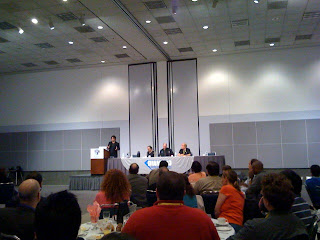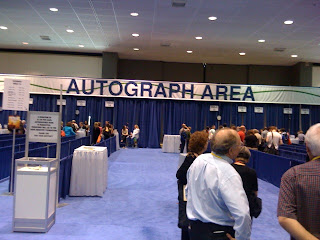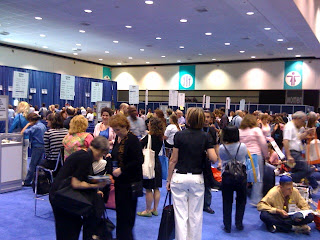What’s playing on the iPod right now? BACK HOME AGAIN by John Denver
Here’s how I can sum up my BEA. With the exception of the Graphic Novel Author Breakfast on Saturday morning, any event I had planned to attend was a bust—real snoozers.
And the one panel that was a spontaneous choice was the one I enjoyed the most—and that was the panel discussion on Hardcover versus original trade paperback for a debut novel.
Basically there was no consensus on whether it helps or hurts an author. Several examples were given for both—of how a trade price point really helped to break out an author and how an author got sunk by the hardcover pub with the higher price point.
There was even mention of my larger concern about not getting the audio deal and foreign rights for an original trade pb (although I have to say that foreign publishers seem very flexible with what they buy and the format doesn’t seem to impact too much).
My hope was that the discussion could veer into new territories, like setting up the possibility of rethinking how original trade paperbacks are bought, their marketing/promo plans (because let’s face it, as agents we are mostly worried about original trades not getting the love from pr and marketing and the reviews needed to really succeed as those aspects have been slow to evolve), and perhaps discuss new trade original royalty structures if more and more books are pubbed as original trades and not hardcovers. Those percentages haven’t changed in a hefty while
I don’t care if something is going to pub in trade pb if I know I can get the support, the backing, and that my author could earn as much via that medium than through hardcover as the original format.
Lots about pubbing original trade make sense and yet, there’s still those possible issues that make it hard not to be hesitant. Still, I see it’s where the industry seems to be leaning so I’d just like to see some other aspects about this format embraced.
But back to the Graphic novel breakfast.

From left: Jeff Smith (author of Bone), Jeph Loeb (producer of Heroes and currently writing Hulk for Marvel), Mike Mignola (Hellboy), and Art Spiegelman (Pulitzer Prize-winner of Maus)
Here’s what I learned. Folks who write and illustrate comic books are passionate about them and a lot of writers have been doing this for some time—long before it was popular.
1. They all were slightly amused by the term graphic novelists.
2. They are, and always will be, comic book writers, thank you very much.
3. They are all slightly amused to be considered “cool” now as well.
The tipping point for comic books happened, for some reason, about 4 or 5 years ago and they knew it when librarians started coming to them with “no need to sell me on the format, I get it but what should I be buying? What’s Good?” That’s when the format had arrived into the mainstream. It’s also not just about comic book publishers anymore. Many traditional publishing imprints (like S&S and Random House) are buying comic books and positioning them like traditional books (for lack of a better word).
I found the whole breakfast, and especially Spiegelman’s visual presentation about the history and the how and why of how he go into it, particularly fascinating.
I certainly can’t say that I’ve been a long-time fan or anything like that but I’m interested. I certainly had a bunch of comic books when I was growing up (boy did this bring back memories) and many of my college buddies wrote, illustrated, and collected comic books so I was certainly exposed to the medium. Now I just need to get back in touch with those guys and say, “hey, your time has come. Maybe we need to dig out those works.”
Last but not least, I thought you’d get a kick out of seeing the author autographing stalls. One author called it horse racing in reverse. It does rather mimic that!



Are you charging for this blog because I feel like I’m getting a lesson from an insider.
Thank you for great information and I didn’t have to pay fees, get a hotel or wear a lovely badge!
Kiki
Appreciate the BEA reports, but have to comment. You’re back home again in Denver, and playing on the iPod is Back Home Again by Denver. Coincidence or are you playing with us? Either way, I like it.
And yet the unpublished masses of us would give so much to be involved in that reverse horserace. Keep on keepin’ on, and maybe one day we’ll all get there. Thank you so much for what you do, Kristin. You and other agents who blog and let us know about the ins and outs are a real blessing to us.
Thanks
Did you get any feel for trade vs. hardcover for genre fiction? Would the issues be any different from those for literary fiction?
I can’t remember the last time I bought hardcover fiction. For $25, that story had better be the best ever.
When I started to blog, I just jotted down the song without thinking. Then I totally started to laugh but honestly, that’s what was playing on the iPod as I was writing the blog entry.
I couldn’t make this stuff up. I’m not creative enough.
k
But Kristin, did you bring back a stack of books?
I found the subject matter of hardback vs. trade paperback very interesting, but you were pretty vague on the subject (or at least apprehensive). More please. 🙂
I actually prefer trade paperbacks to hardcover and don’t mind if a book debuts as trade paperbacks. Promotional and price concerns aside, I just prefer the format. To me, it is the best of both worlds of a hardcover and a mass market paperback: it has the durability of a hardcover, but it’s slightly lighter . It’s got the flexibility of a mass market paperback, but its pages are larger, which means there are less of them and it’s slightly easier to read. I like their heft, how they feel when I’m reading them or carrying them … and that tactile sensation, to me, is why I will always love physical books, even though I can’t wait to see how publishing continues to grow in the electronic medium.
Yet I digress. I will often wait until a book comes out as trade paperback (like I am with Douglas Coupland’s The Gum Thief) before I buy it. So if the issues around publishing as an original trade paperback can change so that authors are still getting the same benefits they do from original hardcover, I’d love to see more original trade paperbacks. 😀
freakishly good timing on this since this very morning I had an editor offer to publish in trade paperback but not hardcover (without more revision). basically had the same conversation with my agent, but it’s sure nice to hear it from another source!
long-time-blog-reader-who-is-going-anon-because-some-lovely-agent-in-Denver-says-you-shouldn’t-discuss-ongoing-pub-efforts-online-till-they’re-DONE-bless-her-for-that
I’m totally jealous. Jeph Loeb is one of my favorite writers ever.
It seems to me that publishing in hardcover is more about publishers’ snobbery than about serving the writer or the reading public. I’m sure there is status associated with coming out in hardcover, but don’t you lose potential buyers/readers? What is the goal?
Loved the discussion about comics. As a long time reader of that genre (actually what inspired me to write in the first place) I am also still shocked by the coolness and legitimacy comic books have gotten in recent years. I believe the first Spider-man movie is largely responsible, and then the amount of good comic book movies that followed is what has kept comics popular. Either way though, I’m glad that starting about five years ago I was finally able to start talking about reading comics openly without people thinking I was a scary dork.
I didn’t get to attend the Graphic Novel breakfast, but the two panels I attended about graphic novels and video games were very interesting. It sounds like a lot of your events turned out rather boring. I’m sorry. (Although the trade paperback vs. hardcover thing does sound like something I’d enjoy.)
Horse racing in reverse! Ha! The autographing area was crazy at times- particularly when I was in the line next to Christopher Paolini’s and couldn’t see the end of his.
I buy hardcovers all the time; whether from new or established authors — doesn’t really matter much. If the book is so awful that I cannot finish it — it goes back to the store the very next day. That’s only happened twice. Too bad. So sad.
Oh and autographing stalls? wtf?!
I don’t do hardbacks. True, I have a couple non-fiction book in hardback, and The Lord of the Rings (in one volume) and The Hobbit in special faux-leather-bound editions, but that’s it.
Why should my shoulders and back suffer any more than they have to? I have 1 pb in trade size (costs a bit more than regular pb, but as another poster said, the type is easier to read for my tired old eyes), and, naturally, a ton in the usual old pb size (can’t beat the price!). Much easier to carry around than those darned hardbacks!
I wouldn’t shed a tear if the industry got rid of hardbacks for novels.
It was nice to sit next to you at the Graphic Novel Breakfast. Thanks for the children’s book recomendations. I picked up Knuffle Bunny Too yesterday and my daughter loved it.
This was my first BEA and I spent a lot of time wandering around aimlessly, completely lost. It was an interesting experience, though. However, I too felt like there wasn’t much innovation going on. Thanks for the post and this great blog. I’ll add a link to mine.
For me, the graphic novel thing started with my awareness of Harvey Pekar due to the film American Splendor. I knew Maus from before then, but AS really made me see what it could all be about.
I was at BEA for the first time ever, working to meet people for the benefit of my employer, the Ohioana Library Association — and Harvey Pekar is an Ohioan.
I also attended the morning buzz meeting, so as soon as my books get here from the show, I think I can list out the 6 titles of new books being pushed by editors.
Leslie (from Ohio!)
I love the horse racing – author signing stalls. That made me smile.